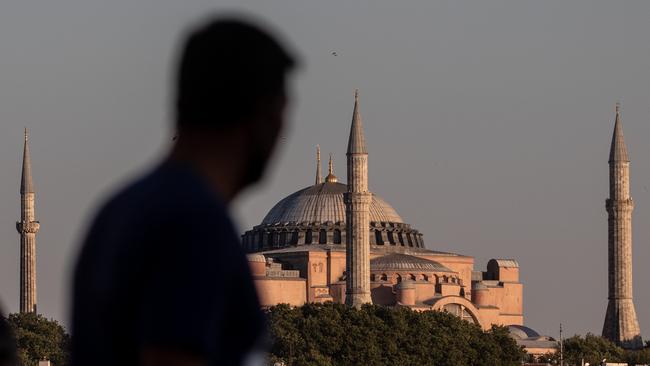Erdogan panders to Islamists and spoils Ataturk’s legacy
Converting the Hagia Sophia into a mosque has handed one of the Eastern and Western world’s great jewels back to the Islamists.

The result of this decision will be to remove one of the world’s most important cultural heritage sites from its international, pan-religious status as a museum. However the other more pertinent political reason to be alarmed by Turkish President Recep Tayyip Erdogan’s decision is that this move originated in a court decision which asserted that the conversion of the Hagia Sophia to a museum from a mosque by the Ataturk regime 1935 was illegal. Thus the decision comes close to asserting an Islamic national identity for Turkey, which means not just a cultural loss for the world, but Erdogan’s decision goes against the principles of the constitution of the Turkish state itself.
The Hagia Sophia or church of the Holy Wisdom had a previous reincarnation as a mosque, after the conquest of Constantinople by the Ottomans. It was converted into a mosque 1453 and during that period its mosaics and murals were whitewashed. The Turkish government has reassured the world the mosaics will only be covered during prayers and visitors will be allowed, but the real historic and cultural importance of the Hagia Sophia today to the world is not as a mosque. It is as a great Byzantine church, but the conversion to a museum of a building that had been both church and mosque was a deliberate symbol by Ataturk of tolerance.
The Hagia Sophia, was dedicated in the 6th century and it has world heritage status for a number of reasons. Firstly it is considered to be the greatest example of Christian Byzantine architecture in the world. For almost 1000 years it was the largest church in the world. It is also the repository of marvellous examples of Byzantine Christian mosaics and murals. The sheer antiquity of the great church built by Justinian overwhelms the visitor and other than the Chora church, which was built 100 years later, its mosaics are some of the last vestiges of eastern Byzantine art in the place where it originated. Turning it into a museum was logical, since it has great artistic and architectural significance for the whole world. Naturally, now that it is a mosque, combined with the force of Islamic religious dominance in Turkish society, there are fears that negating the secular status of the church might result in another era of whitewashed mosaics.
However, there is a lot more to the conversion of the Hagia Sophia than the precarious status of its art. By doing this, Turkey is symbolically turning its back on the secular pluralist foundations upon which the modern Turkish state was founded by its first president and national hero Kemal Ataturk. Erdogan can no longer deny that he is pandering to the Islamists. Despite all his reassurances of freedom of religion and pluralism in modern Turkey in his very long self-serving speech announcing the change in the status of the Hagia Sophia, these ideals look to be have been thrown out the metaphorical window.
Erdogan’s position as President, or in fact benign dictator, is constitutionally precarious and Turkey’s economy, formerly his strong suit, has more recently collapsed, along with its currency. The decision to reconvert the Hagia Sophia to Islam’s most powerful symbol, a mosque, sends a strong message to his religiously conservative supporters. The decision is part of a pattern of behaviour which has pulled Turkey into a vortex of popular and nationalistic Islamist thinking which runs counter to the modern pro-Western approach of Ataturk’s original constitution. This is not just about religion or an ancient building. This decision is about politics and asserting a new pro-Islamist Turkish nationalism, which goes against Ataturk’s ideal of tolerance.
Although a Turkish court found that the 1935 decision was illegal, the Hagia Sophia, like other great world heritage sites, is not subject to the judicial whims of a national government. That is why world cultural heritage sites exist. They stand outside nationalism. Erdogan’s move is illegal under two areas of international law. Firstly, the relevant UNESCO conventions governing the maintenance of international heritage sites which prohibit interventions that only have the approval of the relevant state. In short, Turkey’s decision treats the Hagia Sophia as just another piece of state property and paradoxically, Erdogan stressed in his speech, that he was doing this in order to assert Turkey’s national right. Secondly, the decision is a possible contravention of the European Convention on Human Rights, because the rights of the Christian minority to appeal the decision has been overruled.
Spyros Vlachopoulos is a professor of law at the University of Athens, and has summed up the human rights implications of this decision: “The ECHR cannot cower when faced with an offence on sites of cultural heritage if it wants to retain its image within the EU as the guardian of human rights ... fundamental human rights sometimes must also safeguard the rights of the majority, especially the right of generations to unobstructed access to sites of global cultural heritage”.
By turning the Hagia Sophia into a mosque, Erdogan has effectively compromised that right, and handed one of both the Eastern and Western world’s great jewels back to the Islamists.




One subject that formerly occupied a great deal of airtime and print space, the rise of Islamic fundamentalism, seems to have faded during the current health crises. Presumably the bombers and mad mullahs, were, like the rest of us, locked down. So it came as no surprise, that the reaction to the Turkish government’s decision to convert the Hagia Sophia into a mosque, had more an air of appalled resignation than outrage. Various religious figures have spoken against the decision, including the Pope. The heads of the orthodox religions are particularly angry because the foundations of their religious culture are Byzantine.